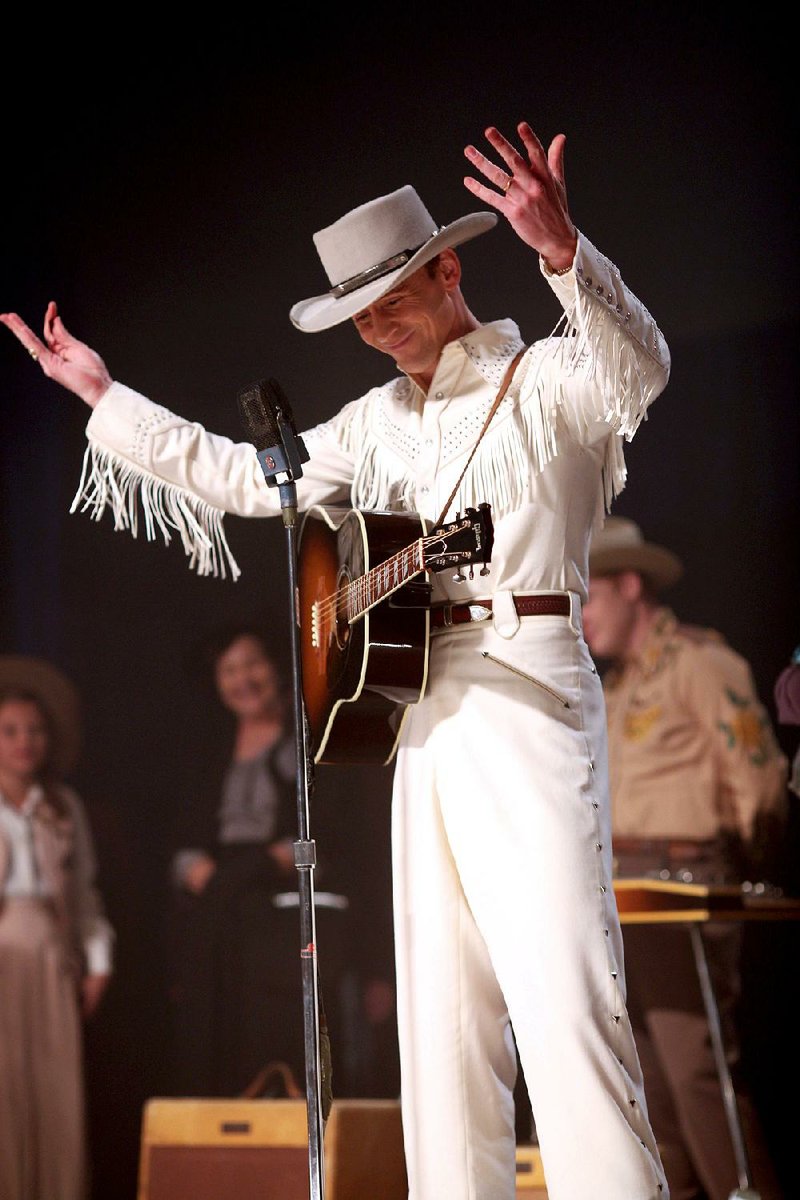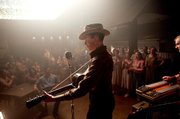Hank Williams' story is short and sad, but he is not of interest because of how he lived and died. His music is as raw as Charlie Patton's or Robert Johnson's. It is as lithe and sophisticated as Frank Sinatra's. His voice was supple and capable of illuminating corners of the darkness other singers wouldn't dare explore. His poetry -- there is no other word for it -- is plain yet deep, rich in nuance yet immediately understandable. Williams was and is country music.
His biography is pretty much beside the point.
I Saw the Light
82 Cast: Tom Hiddleston, Elizabeth Olsen, Cherry Jones, Bradley Whitford, Maddie Hasson, David Krumholtz, Josh Pais
Director: Marc Abraham
Rating: R, for some language and brief sexuality/nudity
Running time: 123 minutes
And so maybe the earnest filmmakers behind I Saw the Light were doomed from the beginning. I've seen a lot of Hank Williams impersonators in my time and Tom Hiddleston makes a fine one, coming close to capturing the lank and teeter of the figure, evoking the great man's instrument with his own aspiring voice. There is nothing wrong with the way Hiddleston plays Williams. He looks the way Williams looks in photographs, he sounds the way he sounds in those recordings where he's apologizing to the audience for not being able to make it to a scheduled show.
His is a very classically acted Hank, a meticulous reconstruction. But the script fails Hiddleston as it turns Williams' story into a soap opera, making it all about the women and the booze and the pain, and admitting the songs less as evidence of the musician's genius than the actor's facility. The result is a beautifully photographed movie that fails to convey the informing mystery of the man.
And for the most part, Marc Abraham's movie avoids plumbing Williams' inner life, instead following a conventional "and then this happened" structure, beginning with the 1944 marriage of Williams to Audrey Sheppard (Elizabeth Olsen), and continuing until Hank's death on New Year's Eve (or New Year's Day 1953). This chronological approach initially feels refreshing, given the fractured time accounts we've seen employed (with varying degrees of success) in other recent bio-pics. But while each episode is fine on its on -- and Olsen is terrific as Hank's problematic first wife, who both abetted and impeded his career if not his artistry -- they have little cumulative effect.
The closest it gets is a surly conversation between Williams and a New York reporter (David Krumholtz), who asks him to explain the power of his medium. A well-lubricated Williams proceeds to lecture him:
"Everybody has a little darkness in 'em. I'm talking about things like anger, sorrow, shame. I show it to 'em and they hear it and they don't have to take it home. Country music, it's sincere. Man sings a sad song, you know he's sad."
I don't know if Williams ever said that, and for review purposes I don't generally consult press kits even when they are provided, but I know he once said something like it. Once, when asked by Rufus Jarman, a reporter writing for, of all things, Nation's Business, the journal of the U.S. Chamber of Commerce, to explain the potency of his material and of country music, Williams put it this way: "It can be explained in just one word: sincerity. When a hillbilly sings a crazy song, he feels crazy. When he sings 'I Laid My Mother Away,' he sees her a-laying right there in the coffin. He sings more sincere than most entertainers because the hillbilly was raised rougher than most entertainers. You got to know a lot about hard work. You got to have smelt a lot of mule manure before you can sing like a hillbilly. The people who has been raised something like the way the hillbilly has knows what he is singing about and appreciates it.
"For what he is singing about is the hopes and prayers and dreams and experiences of what some call the 'common people.' I call them the 'best people' because they are the ones the world is made up most of. They're really the ones who make things tick ... the ones who understand what we're singing about ... There ain't nothing strange about our popularity these days. It's just that there are more people who are like us than there are the educated, cultured kind."
Maybe that's not as easily digestible as the dialogue written for Hiddleston to say. But it at least allows the singer his intent -- his artistry.
I Saw the Light isn't a terrible movie. It's worth seeing for the performance of Hiddleston and Olsen, and the way cinematographer Dante Spinotti bends the whiskey-colored light. It's the sort of movie that might be made about any struggling pop singer, like a movie about the life of Christ that elides the miracles.
MovieStyle on 04/01/2016

